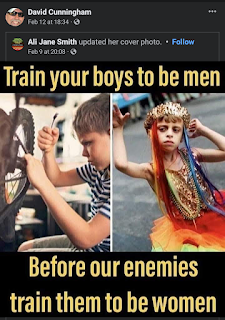As the hate group RV Saltshakers and other bigots step up their protests and attacks, some in the LGBTQ community are seeing an increase in harassment and intolerance
By Brad Smith
JACKSON COUNTY,
Ore – Tyler should be a happy young man: He loves his home, loves his job and
is deeply in love with someone.
He should feel safe – but doesn’t.
“There are
times when I’m out in public, I feel like something bad could happen,” he said.
“There are times when I feel so wary and uneasy, I can’t allow myself to relax
or have fun.”
Tyler is
gay. Openly gay. For him and others who belong to the LGBTQ community here in
southern Oregon, it’s not a very easy thing to be. “I knew who I was early on. I
just knew,” he said. “I accepted it and was fine with who I am. However, many
in my family didn’t handle that very well. There was a lot of hostility and
religious indoctrination. It was for me, emotionally, very brutal. I’m still
coping with PTSD from that time of my life.”
According
to studies published by the National Center for Biotechnology Information
(NCBI), family rejection is strongly associated with mental health problems and
suicidality, substance use, and sexual risk. Not surprisingly, parental
rejection is linked to increased depression, suicidality and substance use
among LGBTQ youth.
The
research also states:
“It is
important to note that those LGBTQ youth who do perceive strong support from
their families tend to have better mental health and lower risk of substance
abuse and – to a lesser extent -- sexual risk behaviors. The presence of
parental support in the lives of LGBTQ youth indicates that parents and their
children were resilient in the face of coming to terms with the teen's LGBTQ
identity, which is often a significant stressor for both parents and teens.”
That wasn’t
the case for Tyler.
“I’ve become
the black sheep of the family,” he said with a laugh. “Some relationships with
my family have been very strained and show no signs of changing. However, things
have gotten better with other family members. It’s been a slow process but it’s
progress nonetheless.”
Over the
past year, he has found love.
“Meeting
Eli is the best thing in my life. I love my job and I do have friends – but
there was something else missing. That was Eli. Having them in my life made all
the difference. However, there was a slight problem. Well, it was a problem for
my family when they learned Eli is Black.”
It didn’t
go well. Tyler said some of his family were “very outraged” upon learning Eli
was Black. There was angry outbursts or tense, judgmental silence.
“I guess
they felt that I’d gone out of my way to piss them off,” he said. “It’s
upsetting because it seems that no matter what I do, or who I am, they’re not
happy and they want to make me feel miserable.”
Eli’s
family is unaware of the relationship.
“Based on
what we experienced with my family,” Tyler said, “Eli and I are taking a more
careful approach. It’s frustrating for us but it’s what we have to do.”
Eli, Tyler
added, has been dealing with prejudice as well.
“It’s like
this: We’ll be walking down the street and a white person gets out of their
car. They look at Eli, stop, turn around and lock the doors. Sometimes, they
don’t hide their fear and hate. You can clearly see it on their faces. It makes
me sick.”
There have
been times when Eli visited Tyler, as they drive through the neighborhood, someone
stopped them and demanded why they’re in the neighborhood or who they’re seeing
in the area.
“People
have used their big pickup trucks to block Eli’s car and then comes the
shouting, the threats,” Tyler said. “Or people will be on the sidewalks or in
their yards, yelling and screaming at him. In my neighborhood, there are more
than a few Trump signs or flags, Blue Lives Matter signs or Confederate flags.”
Tyler said
that he and Eli have talked about moving elsewhere.
“We’re
looking at Talent or Ashland,” he said. “Someplace where we’ll feel relaxed and
safe. Safer, I should say. We don’t want to leave the area; this is our home
and we do love it here. I don’t want to do that.”
Tyler and
Eli aren’t the only ones who feel unsafe in southern Oregon.
A few
years ago, the LGBTQ+ Community Survey was developed by the steering
committee of the LGBTQ+ Listening Project – a group of queer and trans folks
in Jackson and Josephine Counties in southwestern Oregon who came together with
the leadership of Rory Meza in 2019.
The survey’s aim was to learn more about the
needs of the LGBTQ+ community and the resources available in southern Oregon
region. It was developed between February and June 2020, released in July 2020
and remained open until Oct. 31, 2020.
According
to the survey information, more than 550 people responded. Reading
the survey, it was troubling to learn that over 86 percent of those who
answered felt “like they need to leave the area to live a good life.”
Here are
some of the comments:
·
“Many
people tell me I need to move to Portland or Eugene to feel more welcome.”
·
“Grants
Pass is a very hard and dangerous place for non-straight, non-white people to
exist and it's hard to get the money saved to move away due to unlivable wages,
especially for non-white people.”
·
“My
transfemme friend is about to move away, and another transwoman in the
community also left for Baker City. She carries a gun because she never feels
safe here. I think queer folks here are incredibly resilient and interesting
and I would like our stories to be more known without putting anyone at risk.”
·
“This area is an absolutely beautiful place
to live, but the “open mindedness” extends only as far as white supremacy and
privilege has shown through experience. You can’t meditate away oppression.
People here are completely unaware of the BLM movement and revolution needing
to continue happening throughout our country and the world, and people here (as
a generalization) are completely ignorant to queer history and culture.”
·
“Thanks for trying. I moved here from California
because I couldn't afford to live there anymore and it's been a pretty
depressing transition, having such a toxic atmosphere to try and survive in. I
hope it gets better.”
·
“Recent protests have brought out alt-right white
men with their guns. I don't feel safe at all anymore. Can't imagine what QPOC
people feel right now.”
·
“I
moved here for my ex’s job and got stuck here. I’ve been wanting to get out
every day since. Having a community would make a big difference in feeling like
this place was even somewhat politically acceptable.”
But there
was more troubling data, several indications on how serious of a problem southern
Oregon has with bigotry and harassment.
- 77 percent of people reported
“feeling like you have to move out of the area to meet your needs or live
a good life” at least once. 47 percent of people reported feeling this way
frequently or somewhat frequently.
- 80 percent of people reported
“feeling unwelcome at a public event or in a public space because of
your sexuality, gender or appearance” at least once. 32 percent of people
reported feeling this way frequently or somewhat frequently.
- 73 percent of people reported
“harassment or bullying because of your sexuality, gender or
appearance.” 25 percent of people reported feeling this way frequently or
somewhat frequently.
- 83 percent of people reported
“feeling you need to hide or change your sexuality, gender, or
appearance to avoid harassment or discrimination” at least once. 42
percent of people reported feeling this way frequently or somewhat
frequently.
- 32 percent of people reported
“being targeted, harassed, or treated with unnecessary force by
police because of your sexuality, gender or appearance” at least
once. 9 percent of people reported having this experience frequently or
somewhat frequently.
- 45 percent of people reported “being
threatened with or experiencing physical violence because of
your sexuality, gender or appearance.” 12 percent of people having this
experience frequently or somewhat frequently.
Little
over a month ago, Tyler said he “felt being under pressure and depressed.”
He voluntarily
checked himself into a hospital for a 72-hour mental health evaluation. During
that time, Tyler said he was able to “sort things out” and think about his
life.
“I’m glad
I did that, I needed to do that,” he said. “I felt on the edge and needed to get
help. It was scary but Eli and a few other friends were there for me. They
helped pull me back from the edge. I’m very fortunate. Some aren’t that
fortunate.”
It’s a sad,
sobering reality. According to the Trevor Project, suicide is a serious problem
within the LGBTQ community, especially among younger people.
Here are
the facts:
- Suicide is the second leading
cause of death among young people aged 10 to 24 (Hedegaard, Curtin, &
Warner, 2018) – and lesbian, gay, bisexual, transgender, queer, and
questioning (LGBTQ) youth are at significantly increased risk.
- LGBTQ youth are more than
four times as likely to attempt suicide than their peers.
- The Trevor Project estimates
that more than 1.8 million LGBTQ youth (13-24) seriously consider
suicide each year in the U.S. – and at least one attempts suicide every 45 seconds.
- The Trevor Project’s 2021 National Survey on LGBTQ Youth Mental
Health found
that 42 percent of LGBTQ youth seriously considered attempting
suicide in the past year, including more than half of transgender and
nonbinary youth.
It's a lot
of information to absorb but that’s the seriousness of the problem. Tyler
realized how dangerously close he was to having an emotional breakdown or even
suicide. He had a loving partner and a network of close, personal friends who
cared for him.
Some
aren’t that lucky.
“Have
things gotten better? Yeah, some progress has been made. Some,” Tyler said. “But
it can always get better. And there’s a lot of uncertainty – especially here.
We have a lot of hateful people here in the valley and I worry more will join
them. As I said before. Eli and I don’t feel safe here.”
As of this
writing, the two plan to move. Ashland or Talent are looking like safe places
for them. They’ve even talked about Portland. However, Tyler said the last few
times he and Eli were in Ashland, they were met with “unfriendly stares” from people
on the streets or in restaurants.
“It was a
very unpleasant vibe. Shocking, too. Maybe Ashland isn’t safe, not anymore. Are
we safe anywhere? The thing is, I was born here,” Tyler said. “This is my home
and the thought of me being forced out of my hometown really pisses me off. I
want Eli and I to be safe and happy. That’s all I want for us.
“Is that
too much to ask for?”
Those seeking help or question can contact the Rogue Action Center here.
For more information about the survey:
















